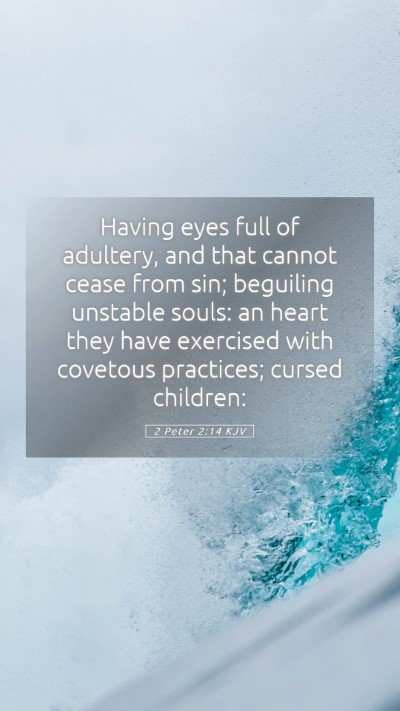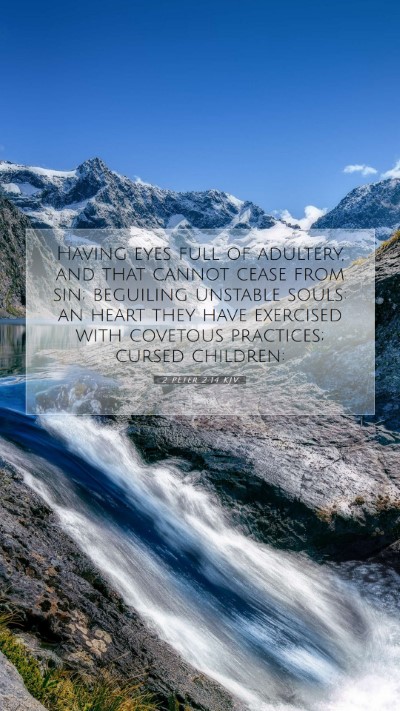Old Testament
Genesis Exodus Leviticus Numbers Deuteronomy Joshua Judges Ruth 1 Samuel 2 Samuel 1 Kings 2 Kings 1 Chronicles 2 Chronicles Ezra Nehemiah Esther Job Psalms Proverbs Ecclesiastes Song of Solomon Isaiah Jeremiah Lamentations Ezekiel Daniel Hosea Joel Amos Obadiah Jonah Micah Nahum Habakkuk Zephaniah Haggai Zechariah Malachi2 Peter 2:14 Meaning
What is the meaning of 2 Peter 2:14?
Having eyes full of adultery, and that cannot cease from sin; beguiling unstable souls: an heart they have exercised with covetous practices; cursed children:
2 Peter 2:14 Bible Verse Meaning
Understanding 2 Peter 2:14
Verse: "Having eyes full of adultery, and that cannot cease from sin; beguiling unstable souls: an heart they have exercised with covetous practices; cursed children." (2 Peter 2:14, KJV)
Verse Meaning and Interpretations
The verse from 2 Peter 2:14 offers a robust warning regarding false teachers and their immoral influence. Various public domain commentaries provide insights into the implications of this passage:
-
Matthew Henry:
Henry highlights the moral corruption of false teachers whose “eyes are full of adultery.” This phrase suggests an insatiable desire for sin and immorality, indicating their inability to be satisfied with what is right. Their allure pulls in the "unstable souls," implying that those who are weak in faith are particularly susceptible to their deceit and manipulation.
-
Albert Barnes:
Barnes emphasizes the phrase “that cannot cease from sin,” illustrating that these individuals are trapped in a cycle of sinfulness. He points out that their motives are driven by greed and covetousness, leading them to perpetrate deception for personal gain. Their callousness makes them “cursed children,” indicating divine judgment upon their actions.
-
Adam Clarke:
Clarke expounds on the expression “hearts exercised with covetous practices,” noting that their hearts are habituated to greed. Their nature as “cursed children” serves as a stark warning to the faithful about the dangers of unholy influences that can lead to spiritual downfall.
Key Themes and Lessons
- Warning Against False Teachers: This verse underscores the reality of false teachers in the church, encouraging believers to exercise discernment.
- The Danger of Sin: The imagery of eyes and hearts reflects the deeper spiritual implications of sin that cannot be overlooked.
- Vulnerability of the Unstable: Emphasizes the necessity for sound teaching and community in protecting those who may be wavering in faith.
Historical Context
This passage can be understood in the broader context of 2 Peter, which focuses on warning early Christians about the presence of false prophets who corrupt the teachings of Christ. The societal issues of the time, including moral decay and spiritual deception, mirror contemporary challenges faced by the church today.
Cross References
- Matthew 7:15 - Warning about false prophets.
- Galatians 5:9 - The danger of a little leaven affecting the whole lump.
- 2 Timothy 3:5 - A description of those who have a form of godliness but deny the power thereof.
Applying the Verse
For today’s reader, 2 Peter 2:14 serves as a sobering reminder of the importance of spiritual vigilance. Engaging with this scripture can be enhanced through various Bible study resources, such as:
- Bible Study Guides: Learn how to identify and resist false teachings.
- Online Bible Study: Join discussions about the significance of biblical warnings.
- Bible Study Lessons: Explore the character and actions of false prophets throughout scripture.
Conclusion
In summary, understanding 2 Peter 2:14 through these various commentaries provides rich insight into the nature of sin, false teachings, and the importance of a strong faith. As we delve deeper, this verse encourages believers to arm themselves with knowledge, seek accountability, and remain grounded in the truth of the Gospel.
This exploration aligns with the SEO goals of providing clarity on Bible verse meanings, fostering a deeper Bible verse understanding, and serving as a resource for Bible study insights.


